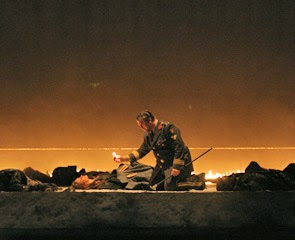AHIR vaig anar a... veure l'òpera de Wagner 'La Valquíria' al Gran Teatre del Liceu de Barcelona.
Yesterday I went to see Wagner's 'Die Walküre' at Gran Teatre del Liceu of Barcelona.
Yesterday I went to see Wagner's 'Die Walküre' at Gran Teatre del Liceu of Barcelona.
L’Anell del Nibelung és un cicle de quatre drames musicals amb text i música de Ricard Wagner que té com a motiu conductor la possessió d’un anell màgic, forjat pel nibelung Alberich, que atorga a qui el posseeix el domini del món. Tots els seus habitants -déus, homes i nibelungs- estan dominats pel desig de posseir l’anell excepte el protagonista: Siegfried, un heroi lliure de les servituds gregàries del poder i de l’or. L’Anell del Nibelung -precedit pel pròleg (Das Rheingold)- és la història de l’origen (Die Walküre), la glòria (Siegfried) i la derrota (Götterdämmerung) d’aquest heroi. Wagner va voler crear així un mite -com els grans mites de la civilització grega- que no fos una mera anècdota, sinó una faula sobra la naturalesa humana amb un valor universal i intemporal, i el basà en textos èpics medievals (segles XI-XIII) com el Cant dels Nibelungs, per tal de crear una mitologia genuïnament alemanya. _The Ring of the Nibelung is a cycle of four musical dramas with text and music by Richard Wagner, which has its central theme the possession of a magic ring, forged by the Nibelung Alberich, which grants anyone possessing it the power to rule the world. All of its inhabitants ─ gods, men and Nibelung ─ are overcome by the desire to possess the ring, except for the protagonist: Siegfried, a hero who is free from the gregarious servitude of power and gold. “The Ring of the Nibelung” – preceded by the prelude (Das Rheingold) – is the story of the origin (Die Walküre), the glory (Siegfried) and the defeat (Götterdämmerung) of this hero. This way, Wagner wanted to create a myth ─ like the great myths of Greek civilisation ─ that was not a mere anecdote but a fable on human nature with a universal and timeless value, and he based it on mediaeval epic texts (twelfth-thirteenth centuries) such as the “Song of the Nibelung” in order to create a genuinely German mythology.
La Valquíria narra l'enfrontament de Brünnilde amb el seu pare, el déu Wotan. Ell ha decidit recuperar l'Anell del Niebelung (símbol del poder dels Déus) per mitjà d'un heroi pertanyent al món dels homes, lliure i sense les seves contradiccions, que no coneix la por ni l'enveja. Aquest heroi serà Siegfried, fruit de l'incest entre Siegliende i Siegmund. _Die Walküre tells about Brünnilde's confrontation with his father, the god Wotan. He has decided to recover the Ring of Niebelung (symbol of the power of the Gods) by means of a hero belonging to the world of men, free and without contradictions that knows no fear or envy. This hero Siegfried is the result of incest between Siegmund and Siegliende.
En aquest segon capítol de l'Anell dels Nibelungs, història la base de la qual ens recorda a la novel·la de ficció El Senyor dels Anells, de J. R. R. Tolkien, on també tothom vol posseir l'anell, hi ha, com a mínim un parell d'escenes que ens recordaran d'altres històries... Per una banda la llegenda del Rei Artur que, com Siegmund, és l'únic home que pot extreure una espasa allà d'una roca, i aquí d'un freixe. Per l'altra, ens recorda al conte de la Bella del bosc dorment (1679; germans Grimm, 1812), de Charles Perrault, on la princesa queda adormida allà retinguda per un bosc d'imponents esbarzers, aquí protegida per les flames, però en ambdós casos tot esperant l'arribada d'un valent cavaller. _The Ring of the Nibelungs reminds us the fictional novel The Lord of the Rings, by JRR Tolkien, where everyone wants to own the ring. There is, at least, also a couple of scenes that remind us other stories... one side the legend of King Arthur, because Siegmund (Die Walküre) is the only man who can get the sword from a place (there it was a rock, here is an ash). On the other hand, it also reminds us of the story of Sleeping Beauty (1679, Brothers Grimm, 1812), by Charles Perrault, where the asleep princess is 'retained' there by a forest of towering bushes, and here 'protected' by the flames, but in both cases awaiting the arrival of a brave knight.
Nauttikaa! Gaudiu_Enjoy!
MOI, MOI!








Cap comentari:
Publica un comentari a l'entrada